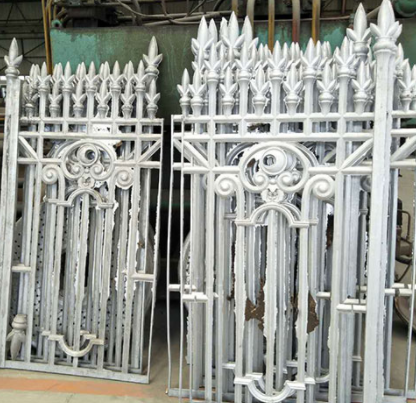Aluminum Casting 4 Kinds Of The Surface Treatment Process
The following are the four common surface treatment methods of aluminum casting.
The alkaline electrolytic polishing process for aluminum
We conducted a study on an alkaline polishing solution system, compared the effect of corrosion inhibitor and viscosity agent on the polishing effect, and successfully obtained an alkaline solution system with a good polishing effect. And for the first time, we obtained additives that can reduce the operating temperature, extend the service life of the solution, and also improve the polishing effect. The experimental results show that the addition of appropriate additives to NaOH solution can produce a good polishing effect. Exploratory experiments also found that: the surface reflectivity of aluminum can reach 90% after DC constant pressure electrolytic polishing with NaOH solution of glucose under certain conditions, but further research is needed because the experiment is still unstable. The feasibility of using the DC pulse electrolytic polishing method to polish aluminum under alkaline conditions was explored, and the results showed that: The use of the pulse electrolytic polishing method can achieve the leveling effect of DC constant pressure electrolytic polishing, but its leveling speed is slower.
Aluminum phosphating
By using SEM, XRD, potential a time curve, film weight changes, and other methods to study in detail the promoter, fluoride, Mn2+, Ni2+, Zn2+, PO4; and Fe2+ and other effects on the phosphating process of aluminum. Research shows that: guanidine nitrate has good water solubility, low dosage, rapid film formation, and is an effective promoter of aluminum phosphating. Fluoride can promote film formation, increase film weight, refining grain. Mn2+, Ni2+ can significantly refine the grain, so that the phosphate film is uniform, and dense and can improve the appearance of phosphate film. Zn2+ concentration is low, and can not be film or film-poor. With Zn2 + concentration increases, the film weight increases O4 content of phosphate film weight effect. With increased PO4, the content of phosphate film weight increases.
>> Shop for our aluminum casting here
Electrochemical surface strengthening treatment of aluminum and its alloys
The process, properties, morphology, composition, and structure of the ceramic-like amorphous composite conversion film formed by anodic oxidation deposition of aluminum and its alloys in a neutral system were initially explored to investigate the film-forming process and mechanism of the film layer. The results of the process study showed that in the neutral mixed system of Na2WO4, the concentration of the film-forming accelerator was controlled to be 2.5-3.0g/l. The concentration of complexing film-forming agent was 1.5-3.0g/l, the concentration of Na2WO4 was 0.5-0.8g/l, and the peak current density was 6-12A/dm~2. Weak stirring resulted in a complete and uniform gray series of inorganic nonmetallic films with good glossiness. layer. The film thickness is 5~10μm, microhardness is 300~540HV and excellent corrosion resistance. The neutral system has good adaptability to aluminum alloy, and it can form film well on many series of aluminum alloys such as rust-proof aluminum and wrought aluminum.
Aluminum and aluminum alloy environmentally friendly chemical polishing
The process, properties, morphology, composition, and structure of the ceramic-like amorphous composite transformation film deposited by anodic oxidation of aluminum and its alloys in a neutral system were initially discussed. The results of the process study showed that in the neutral mixed system of Na_2WO_4, the concentration of film-forming accelerator was 2.5-3.0g/l, the concentration of complexing film-forming agent was 1.5-3.0g/l, the concentration of Na_2WO_4 was 0.5-0.8g/l, the peak current density was 6-12A/dm~2, and the weak stirring, a complete and uniform gray series of inorganic non-metallic film with good gloss could be obtained. non-metallic film layer. The film thickness is 5~10μm, microhardness is 300~540HV and excellent corrosion resistance. The neutral system has good adaptability to aluminum alloys, and it can form the film well on various series of aluminum alloys such as rust-proof aluminum and wrought aluminum.
We offer aluminum casting and support customization. Please feel free to contact us if you need them.


评论
发表评论